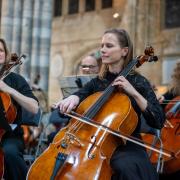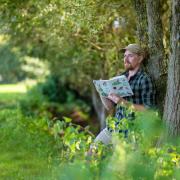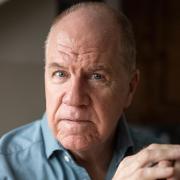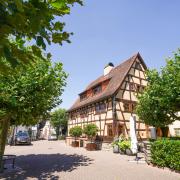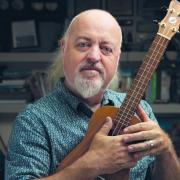This year Plymouth begins the build-up to the anniversary in 2020 of the sailing of the Pilgrims for America. SU CARROLL talks to Charles Hackett of Mayflower 400 about this ambitious project

On 16 September 1620 The Mayflower left England behind, sailing from Plymouth on a perilous 66-day crossing for the New World and a new life. On board the 100ft long merchant ship were 30 crew and 102 passengers, some escaping religious persecution, others simply economic migrants.
They arrived in Massachusetts on 26 December at a place they named Plymouth Bay and while still on board signed The Mayflower Compact – the first agreement for self-government to be created and enforced in America and, inspired by the Magna Carta, the basis for what became the American Constitution.
Today around 35 million people can trace their ancestry back to the Pilgrims – meaning Mayflower 400 commemorations will resonate across the globe, particularly in the United Kingdom, America and Europe.
A modern partnership established to mark the 400th anniversary, The International Mayflower Compact, connects Plymouth with other destinations including three in the USA, two in the Netherlands where the religious separatists had sought refuge and a further ten in the UK including original departure point Southwark and the ports of Southampton and Dartmouth.

Mayflower 400 will remember this significant voyage, but also celebrate shared values of freedom, democracy, humanity and the future. It’s all neatly summed up in the slogan for the project: “Steering our future, inspired by the past.”
Plymouth is lead national partner in the new Mayflower Compact with an enthusiastic ambassador in Charles Hackett, chief executive of Mayflower 400.
“It’s about doing things around that history and heritage to engage, and challenge and explore,” says Charles. “To take themes and ideas. Like the freedom to be who you want to be, freedom from religious persecution and the future – what could, and what should the future be?
“These concerns run through history and are still things we can relate to today. It’s about the idea of crossing in small boats looking for a better world. It’s also about the links between Britain and the US, Britain and the Netherlands and people in those communities. “These are all very current resonances. It serves as a vehicle to have conversations about what we need to have conversations about.”

Mayflower 400 started as a simple idea to mark the anniversary and has snowballed. It will connect many different communities and generate initiatives and projects that will have a long-standing impact such as The Box, the major redevelopment of the Plymouth’s Museum and Art Gallery which is undergoing a £23 million plus transformation and opens in 2020 in time for the Mayflower anniversary.
“The Mayflower 400 has three key elements,” explains Charles. “The capital investment using this Mayflower 400 narrative will enable us to do some things here and across the national partnership, funded by councils, private investment, Arts Council England, Plymouth University, the Heritage Lottery Fund and a number of others.
“It’s also about the heritage and visitors. It’s an obvious thing but we still need to do it well with the marketing of Mayflower trails and the people and places in the story.
“There’s also the cultural programme which elevates it to another level. There’s community engagement which will allow people to take part in ways they want to – music, dance, contemporary and visual art. It will be a real crossover. There’s some early stuff already going on in sport and Plymouth Argyle Community Trust are involved along with Plymouth Albion and the Plymouth Raiders basketball club.

“We are building up to some large scale events in 2020 with mass participation including some on the water – the reason why Plymouth is part of the Mayflower story. It’s not just for Plymouth, it’s for all parts of England and each community has their history and their heritage. We look at the wider impact on the world. It’s more exciting than just the history.”
Charles is already noticing a change of mood in Plymouth and thinks it will reap the kind of benefits that Hull did as a City of Culture.
“Plymouth is amazing and really creative. There are a lot of creative start-ups considering the size of the city. It’s important that the community recognises that and is proud of it. This event showcases the city and gives it a sense of place. It’s about living somewhere that is the sort of place that does this. The Box will change the look of the city centre, and the waterfront is changing too.
“It’s about the community taking part and creating memories to be proud of. It’s about not settling for ‘good enough for Plymouth’.”
Register for updates at mayflower400uk.org. For information on the Mayflower 400 sporting events go to argylecommunitytrust.co.uk.
Mayflower People
Charles Hackett was born in Guernsey – his mother is Dutch and his father a half English, half Irish Army officer. He has a Classics degree from Bristol then spent 17 years in the health care sector at GlaxoSmithKline.
“I stayed at GSK because I loved the company. I did all sorts of exciting things, including working abroad, and I worked with some amazing people. In my last four years I worked on medicines to deal with the disease that killed my father. That was important to me; the motivation to do something that derives benefits.
“This job seemed like an opportunity to do something interesting in a place I wanted to live. It was about putting down roots and not just adopting a place but being adopted by a place. We moved into our house late December 2016 and I started work on Mayflower 400 on 2 January 2017.”




